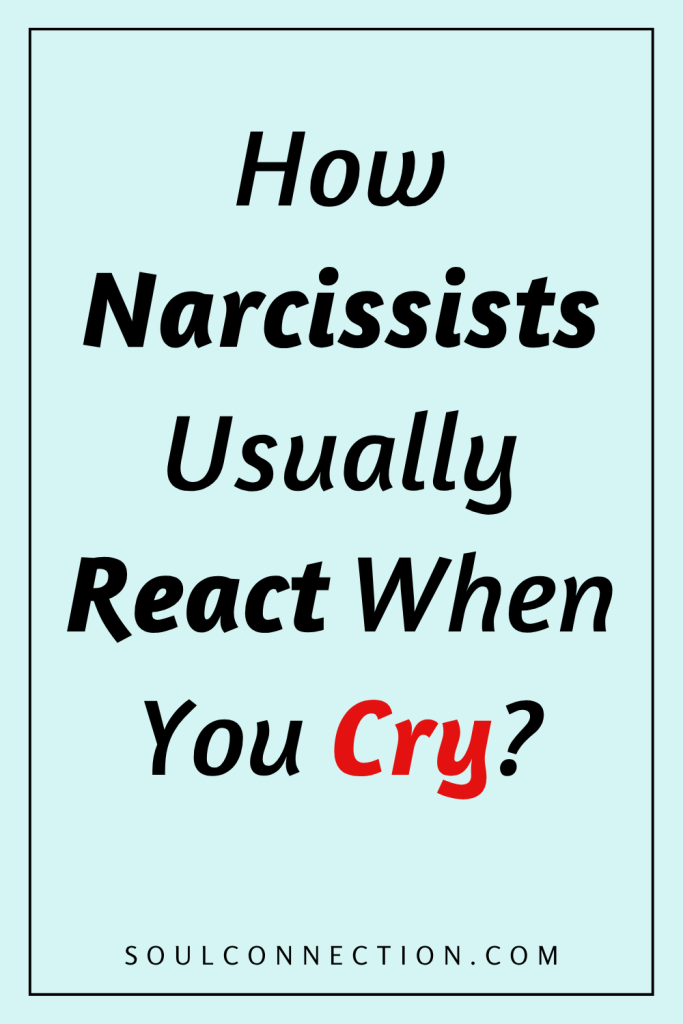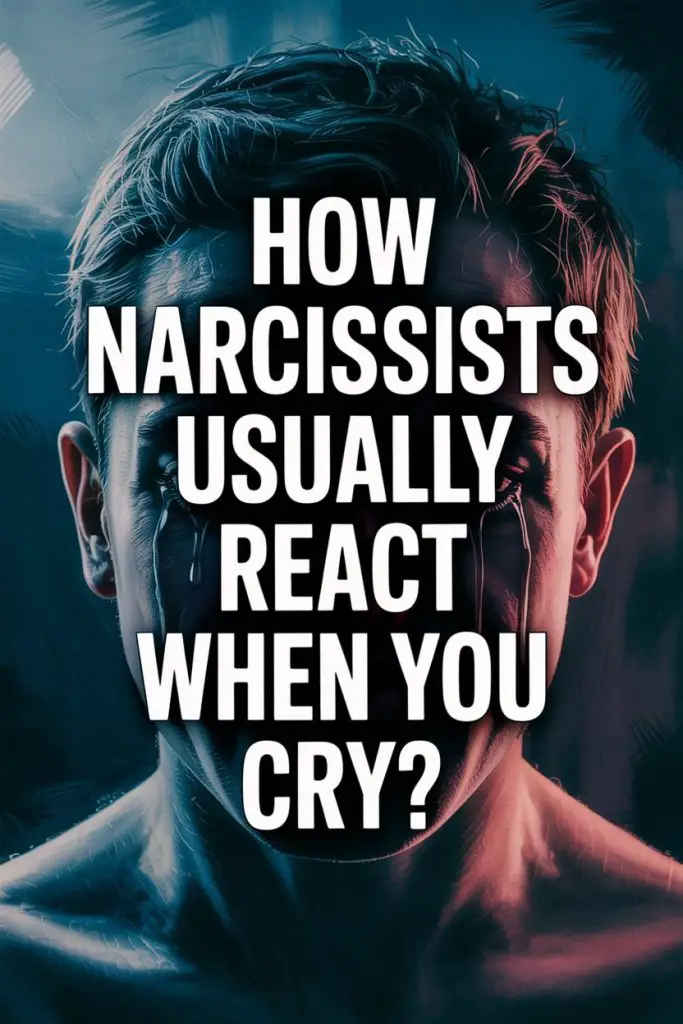Tears are odd little things. Sometimes they get you a hug, other times they cause a loved one to fetch your favorite chocolate.
And then there’s what happens when you cry in front of a narcissist—an experience that can feel like you’ve just shown a cat a cucumber. Not exactly soothing.
If you’re wondering what’s actually going on behind those laser-focused eyes when your emotions spill over, you’re in the right place.
The Emotional Vacuum Cleaner Effect
Imagine you’re in tears, expecting comfort, and instead you’re met with a blank stare or, worse, a look of thinly veiled disgust.
Narcissists tend to treat other people’s tears like an alien artifact: they don’t quite know what to do with them, and, honestly, they’d rather not get involved. Emotional messiness is not on their agenda unless it spotlights them.
Most narcissists have the self-awareness of a goldfish when it comes to empathy. Your crying doesn’t register as a cue to provide support. Instead, it often becomes an inconvenience, or even worse, an opportunity.
The “Make It About Me” Routine
A narcissist observing your emotional breakdown isn’t likely to think, “Wow, they need my support.” Instead, the gears start turning:
Am I being blamed for this?
How does this affect my evening?
Is anyone watching me be a hero here?
Cue the classic mood shift. In this script, your tears become secondary to their performance, their inconvenience, or their need for validation.
You might get a dramatic sigh, an eye roll, or even a speech about how hard your feelings are for them to deal with. Suddenly, you’re consoling them. Magic.
Emotional Dismissal, With a Side of Guilt
Nothing says “supportive partner” quite like, “You’re too sensitive,” or “Why do you always have to make things so dramatic?” Narcissists are Olympic-level emotional dismissers.
The combination of apathy and blame can leave you reconsidering your own sanity. If you find yourself apologizing for crying in the first place, congratulations: you’ve been guilt-maneuvered.
The aim here isn’t to make you feel better. It’s to get you to stop being inconvenient. Bonus points if you start questioning your own emotional reality.
Using Tears as Ammunition
Some narcissists don’t just ignore tears—they file them away for future ammunition. That breakdown you had last week? Expect it to be referenced the next time you try to express a legitimate need.
“You’re always crying over nothing.”
“Last time you cried, it ruined dinner.”
There’s a special kind of sting when the things that hurt you most get weaponized in a future argument. This isn’t just a lack of support; it’s storing up your weakness for strategic advantage.
The Sympathy Performance (If There’s a Crowd)
Narcissists, when faced with an audience, can suddenly turn into the world’s most concerned partner, all hand-holding and back pats. Why? Because there’s nothing quite like milking your suffering for social points.
Out in public, your tears become a chance for them to play the hero. At home, the costume comes off, and you’re left with someone who’d rather be anywhere else.
The contrast can be dizzying, and you might start to wonder if you’re making it all up. (Spoiler: you’re not.)
Turning the Spotlight Back
Let’s say you muster the courage to share why you’re upset—maybe even point out something hurtful they did. Suddenly, you’re not the wounded party.
Instead, the conversation slides into how your sadness is actually hurting them. Or how they, too, have suffered, and now you’re bringing up old wounds.
This is the narcissist’s secret sauce: flipping the script so they’re always the ones in need of sympathy. Your tears become a jumping-off point for their grievances—a neat trick that leaves you feeling guilty for even having feelings.
Stonewalling and Emotional Disconnection
Sometimes, narcissists take the “no response is the best response” approach. Tears are met with silence, or the person physically leaves the room.
It’s a strange kind of punishment—a clear message that showing vulnerability gets you nowhere. This emotional stonewalling can feel colder than the look your dog gives when you walk past the treat jar without stopping.
The message is clear: don’t bring your feelings here. Not unless you want to be left alone with them.
Mockery and Minimization
The crueler variety of narcissist might actually mock your tears. Maybe it’s a sarcastic, “Are you going to cry again?” or an exaggerated impression of your sobs. If you weren’t already feeling raw, that’ll do the trick.
Minimization is just as damaging, only sneakier. “It’s not that bad.” “Other people have it worse.” Suddenly, your pain is trivial, and you’re left wondering if you’re just being melodramatic.
The Occasional Short-Lived Pity
Even the most self-absorbed individuals can sometimes muster up a short burst of concern—usually if there’s something in it for them. Think of it as emotional fast food: a quick fix, zero nutrition.
This might look like a pat on the shoulder or a rushed “Are you okay?” before returning to the regularly scheduled programming.
Don’t be surprised if this brief interlude is followed by a request or demand that benefits them.
Gaslighting in Real Time
Crying in front of a narcissist is often the start of a gaslighting double feature. Suddenly, your tears have no basis. “That’s not what happened.” “I never said that.” “You’re remembering it wrong.”
If you weren’t confused before, you will be now. The goal is to get you to doubt your emotional reality, so that next time, you bottle it up—or better yet, question whether you’re even allowed to have feelings at all.
Emotional Blackmail
There’s a fun twist where your tears are hijacked for leverage. Some narcissists will suggest that your crying is a form of manipulation, accusing you of using your emotions to get your way.
Now you’re the bad guy for… feeling bad? Welcome to the emotional funhouse, where nothing is quite what it seems.
Conditional Comfort
Every now and then, you might get a crumb of comfort—on their terms, of course. Support is doled out when it keeps the peace or when they get something in return.
This comfort is transactional: a hug or a shoulder to cry on, followed by an expectation that you’ll drop the issue or repay the favor in some way. Emotional generosity doesn’t come free in this arrangement.
What To Do When Your Tears Meet a Narcissist
Staring down a narcissist’s indifference or scorn when you’re vulnerable isn’t just painful—it’s disorienting. But it doesn’t have to become your normal.
Find a “reality check” friend—someone whose empathy settings are permanently switched on. They can remind you that your feelings aren’t too much, and that support doesn’t come with strings attached.
Journaling after these interactions can help clarify what actually happened versus the story you’re being sold. This keeps your emotional compass pointing somewhere sane.
Establishing boundaries, even small ones, acts as a subtle “no entry” sign for emotional manipulation. Maybe it’s stepping outside to cry in peace, or telling your partner you need some time alone.
If you’re starting to feel like you’re in a one-person soap opera, therapy (with a therapist who gets narcissistic dynamics) can help untangle the mess. No, you’re not overreacting.
Your Feelings Still Count
Crying around a narcissist can leave you feeling like your pain is invisible or, worse, something to be ashamed of. Here’s the truth: your tears are valid, and you don’t need permission to have emotions.
Support exists—and sometimes it starts with refusing to hand the mic over to someone who only wants to turn your vulnerability into their spotlight.
Sometimes, the bravest thing is letting yourself feel, especially in a world (or a relationship) that tells you not to. Your tears aren’t the problem.
The reaction you get from someone unable, or unwilling, to meet them with kindness is. And that, my friend, is a good thing to cry about—preferably somewhere you’ll actually get a hug.


